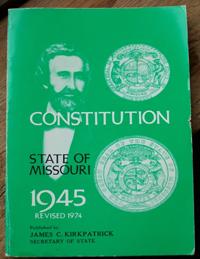The Constitution of the State of Missouri is a mess. At least that’s how it appears to me, compared with the federal document of the same name. That constitution is little more than a pamphlet, setting forth, briefly and in general terms, the extent of the powers of the federal government. The Missouri Constitution, by contrast, is a six by nine inch volume of 238 pages — including index — (I have the 1974 revision; it’s probably larger now) delving into all sorts of minutiae that seem out of place in a constitution.
For example: in Article IV: Executive Department, we find sections dealing with highways, transportation, agriculture, consumer affairs, conservation, public safety, higher education, and non-discrimination in appointments.
Article VI, entitled Local Government, contains Special Charters, and has five pages devoted to City and County of St. Louis.
There are also articles dealing with suffrage and elections, education, as well as railroads and banks.
 Of course, the very beginning of this weighty document does contain a Bill of Rights, the first Section of which sets the tone: "Source of political power — origin, basis, and aim of government. — That all political power is vested in and derived from the people; that all government of right originates from the people, is founded upon their will only, and is instituted solely for the good of the whole." There are similarly soothing words guaranteeing habeas corpus, religious freedom, and due process. Most of them are unchanged from their original appearance in the state constitution of 1875, the state’s second constitution, following the original of 1820.
Of course, the very beginning of this weighty document does contain a Bill of Rights, the first Section of which sets the tone: "Source of political power — origin, basis, and aim of government. — That all political power is vested in and derived from the people; that all government of right originates from the people, is founded upon their will only, and is instituted solely for the good of the whole." There are similarly soothing words guaranteeing habeas corpus, religious freedom, and due process. Most of them are unchanged from their original appearance in the state constitution of 1875, the state’s second constitution, following the original of 1820.
What the Constitution of the Show Me State does not show me, however, is the basis upon which the authors of the document (whoever they might be) claim authority to write it in the first place. Yes, the first section quoted above piously declares that all political power is vested in and derived from the people. But "the people" did not write that, and even if they ratified it at the polls, it is doubtful that a majority of them so voted. It’s heartening to know that we have the right to habeas, and due process, but do we need some nameless strangers to tell us that? And, more importantly, by what authority do they issue these proclamations? Their power, it would seem (even their power to insist that the people are its source!) is self-bestowed.
Claiming, in the first few pages of the Constitution, to act solely for the good of the people, they then, in the succeeding couple of hundred pages, tell their masters, the people, how banking, education, and railroads are to be regulated — among other things. And, of course, in the several sections on taxation, they claim the need to put their hands into our pockets, but not to worry: since they are the rulers, and act only for the good of the whole, we’ll all benefit from the looting. And, naturally, they can always defend their actions as lawful. They can say this without blushing, because experience has taught them that no one is going to stand up and exclaim, "But YOU LOOTERS write the law!" (The story of the Emperor’s New Clothes was just a fairy story, after all.)
It’s probably our own fault. In the remote past, our predecessors accepted the idea of a group of people who would protect them, and guard their rights. And possibly those who offered such guarantees were quite sincere in their offer. If such a premise is accepted, however, a question arises: how is this benevolent association going to support itself? Since it operates for the benefit of all, all must pay their share. (We still accept this premise today, even though the state’s annual surplus of income over expenses is a couple of billion dollars.) And this organization must be allowed the use of force, if it is to guarantee public safety, harmony, and peace, not to mention the collection of taxes. It must be, in a word, empowered. And, to coin a phrase, power corrupts, as we can see for ourselves as we watch the spectacle of government run amok.
The head of the household makes the rules. If I am a guest in your home, I will not eat meat, if you are vegetarians. I will not smoke, if you do not permit smoking in your house. It is, after all, YOUR house.
In making rules for Missourians, the rulers of the state are telling us it’s their state, and we are guests, tolerated insofar as we obey their rules (although it is our enterprise that keeps the whole establishment going). Is that true? Do they own Missouri? From whom did they obtain it, and how much did they pay? Was it given to them? When? By whom?
Are we slaves, working for the plantation owner? But if WE own the plantation, and are the source of its power, why do we take orders from people who declare themselves to be our public servants?
The sad reality is 180 degrees from the truth!
Dr. Hein [send him mail] is a retired ophthalmologist in St. Louis, and the author of All Work & No Pay.



